In Memoriam: Comrade Omar Latif (1952-2021)
A tribute to a tireless communist, chief among “the misguided”.
It was snowing heavily the day Pakistan’s then-military dictator, General Mohammed Zia-ul-Haq, came for an official visit to Toronto in 1982. Reviled to this day, Zia-ul-Haq instituted a draconian regime characterized by repression of democratic and progressive politics, the brutalization of society by crassly mobilizing Islam, entrenching the military in the country’s political economy, and cementing Pakistan’s position as a client state of US imperialism at the height of the Cold War.
Zia’s nearly decade-long regime had begun in 1979 with a military coup d'état and this visit to North America was a bid to secure legitimacy while appealing to Pakistanis in the diaspora for funds and support. For their part, these elites turned out in large numbers, enticed by promises of financial reward and bitten by the somewhat redistributive policies of populist prime minister Zulfiqar Ali Bhutto whom Zia had just overthrown. A reception of 1000 Pakistani-Canadians was hosted by the Pakistani embassy at Toronto’s landmark Royal York Hotel, where Zia held forth his audience.
But outside the hotel, a few individuals braved the elements to stage a protest. They were chanting loudly, hoping to disrupt the event. They succeeded in getting to Zia – in his speech, he took care to praise those gathered within the room, and mock “the misguided few” who were chanting outside. Leading this protest was Omar Latif.
This, then, is our tribute to Comrade Omar Latif – chief among the “misguided”. After battling chronic illness, Omar suddenly left us on August 10th last year. His inexhaustible energy, relentless organising, and unceasing commitment had been at the heart of multiple left-wing, communist, and South Asian groups in Toronto. The void of his absence has been all too sudden and significant. Our words here cannot do justice to Omar, but this is our attempt to honour his life, his struggle, and his legacies in the Pakistani, South Asian, and Canadian Left. This article on Omar has been put together with invaluable input from Abbas Syed, Farah Malik, Fozia Tanveer, and Frank Saptel.
We also invite friends and comrades to contribute their tributes to Omar as comments on this article, which will be preserved.
Image: CPPC
After the protest against Zia-ul-Haq, Omar along with friends and comrades Arif Raza, Rizwana Jafri, and Dr. A.Qayyum Lodhi, established the Committee of Progressive Pakistani Canadians (CPPC). This was envisioned as a political organisation to defend and advance left-wing politics both within Pakistan and the Canadian-Pakistani diaspora.
The conditions were extremely hostile and dangerous for anyone struggling for secular, democratic or left-wing politics in a Pakistan at the frontlines of the US-sponsored jihad against the Soviet army in Afghanistan. The Zia regime had executed the elected Prime Minister Zulfiqar Ali Bhutto. Repression, disappointments, and setbacks for what used to be a formidable Left, throughout the Bhutto regime and then under Zia’s dictatorship led to severe despondency and sense of defeat. It was here that CPPC as a diaspora organisation offered political and intellectual space as a refuge and an opportunity. They hosted formidable Pakistani left-wing academics, organisers, and activists, from Hamza Alavi and Eqbal Ahmed to the recently departed Aijaz Ahmad, for talks and debates with the Pakistani community.
CPPC remained Omar’s life-long mission. His comrades admired his tireless energy and commitment to the organisation. Even in his final days when Omar rushed to the hospital for complications with his heart, he was riveted on upcoming CPPC activities and remarkably active on the organization’s WhatsApp group. His comrades scarcely suspected that he was, in fact, in emergency care. Besides being a political organisation, CPPC was also at the heart of Omar’s personal and community life, and remains closely linked to many progressive left communities in Toronto. It was also where Omar developed his closest friendships and comradeships.
Journey to the Left
Born in 1952 in a lower middle class Punjabi family in Karachi, Omar completed his early education first at Lawrence College Murree and then at Karachi University with a Masters in Political Science. This was a time of intense ideological foment on Pakistan’s university campuses and, though he hadn’t formally joined a student group, he was sympathetic to left-wing student and trade union politics. In the early 70s, he left for employment to Oman, joining a wave of Pakistani migrants to the Gulf during the ‘oil boom’. From there he immigrated to Toronto, Canada, joining his elder brother.
Along the way, Omar was becoming committed to Marxism and left-wing politics — a commitment that remained unwavering until the end. In Toronto, Omar formally joined the Communist Party of Canada, headquartered at the time on Cecil Street. Upon the Party’s request, he left a well-paid job at the University of Toronto Library to take over the management of the Party’s publisher and bookstore, Progress Books. It was a job ideally suited for Omar’s love of books, poetry, and the written word. His comrades credit him for playing a crucial role in steering the bookstore through tumultuous times. However, the dissolution of the Soviet Union reverberated in the form of a severe ideological and leadership crisis within the Communist Party of Canada. The Party split into two rival factions. Progress Books was liquidated and Omar found himself out of a job.
Image: CPPC
He then secured a brief stint teaching English at a private school in Lebanon but ended up organising the school’s staff to form a union. This did not please his employers, so when his employment contract ended, it was not renewed. Omar returned to Toronto, rejoined the Communist Party, and threw himself into union organizing work. He worked for the hotel workers union, Unite Here Local 75, and led many delegations in Toronto’s annual Labour Day parade. Later, he moved to the local chapter of the International Federation of Professional and Technical Engineers from which he ultimately retired in 2018. Here, Omar played a central role in organizing legal aid lawyers across Ontario to form a union — a historic achievement since this was the first time that legal aid lawyers were unionized at this scale in North America. Omar also remained a committed anti-racist activist struggling against the Apartheid regime in South Africa and challenging various forms of race-based discrimination in Canada.
In Toronto, Omar also met his partner Simin – herself a member of Iran’s communist Tudeh Party and actively involved in anti-monarchy struggles that overthrew the Shah of Iran. The Tudeh Party was banned after the 1979 Iranian revolution and left/communist activists were being persecuted and forced to leave the country. Omar and Simin’s home (along with their daughter Maya) is remembered as a hub of social and political activity – “open hearts and open doors” – for the organizations and communities they were dedicated to. Their annual barbecue fundraiser for the Communist Party of Canada’s paper The People’s Voice was a key fixture in the calendar, a meeting place for many friends and comrades, old and new.
CPPC – the Politics and Vision
The CPPC was envisioned as an explicitly political organization – a space to protect progressive, left-wing, and secular politics, as Zia-ul-Haq’s dictatorship brutally disfigured Pakistani society through a militarized and misogynistic Islamic nationalism project, aligned with the US-sponsored anti-Soviet jihad. Thus, a key motivation for the formation of the CPPC was to support people’s struggles for democracy in Pakistan against recurring military dictatorships, especially that of Zia. The CPPC hosted leading lights of the progressive movement for public seminars — the fierce anti-imperialist insurgent Eqbal Ahmad, distinguished social theorists Hamza Alavi and Aijaz Ahmad, as well as prominent Left leaders Rasul Baksh Palijo and Meraj Muhammad Khan.
Though it was conceived against Zia-ul-Haq’s militarism, the CPPC grew into an organization with a wide-ranging and universal programme. Over time, it sought to revive and grow a progressive political consciousness in Pakistani-Canadian communities which were increasingly turning towards either right-wing Islamism or liberal politics of patronage (e.g. joining electoral campaigns for different Liberal and Conservative MPs). They also held popular cultural activities as a way to protect and foster the traditions of political art, literature, and poetry. And they continued to maintain strong links with left-wing organizations and communities in Pakistan, extending solidarity and support as needed.
Omar holding a Palestinian flag as he walks alongside protesters at a Free Palestine demonstration. Image: CPPC
One of the major goals of CPPC was to connect working-class Pakistanis in Toronto with movements of the working people in Canada. Omar wanted the CPPC to be strongly aligned with Canadian trade union and workers’ struggles, as well as the broader Toronto/Canadian Left — a fact that is reflected in the membership of CPPC even today. His rationale was simple — a significant proportion of Pakistanis in Toronto were working-class but they were neglected from mainstream organizing efforts. In fact, working-class Pakistani communities, such as those in the eastern inner-city suburb of Scarborough, remain one of the most disadvantaged communities in Toronto even today.
The events of 9/11 and the US “War on Terror” brought new challenges for Pakistani communities across the West — extreme social and political marginalisation due to racism and Islamophobia as well as intensifying suspicion and violence from Western states, justified by the pretext of “anti-terrorism” policies. Here, despite his avowed atheism and commitment to secularism, Omar (and the CPPC) evolved their politics in support of working-class communities facing oppression for their identity as Muslims.
Omar joined anti-war campaigns and, through the CPPC. was also a part of “Project Threadbare”, an activist coalition formed to defend 23 Pakistani-origin (and one Indian-origin) male Muslim students falsely accused of terrorism and imprisoned by the Canadian RCMP. Although no charges were ever laid against them, the men spent up to five months in prisons, withstood severe harassment and interrogation and were eventually deported, their reputations forever damaged. No evidence was ever brought forward against them.
CPPC hosting the late Dr. Hassan Nawaz Gardezi (4th from Left). Image: CPPC
Abbas Syed — one of Omar’s oldest friends and comrades in Toronto — represented CPPC in Project Threadbare, while another CPPC founding member, Arif, served as a lawyer for one of the students. Abbas recalls being surprised that not a single Pakistani community organisation stood up to support the students. Among the diverse group of activists leading the project, organising legal support, and contributing to post bail was an Indian leftist Govind Rao, who taught at York University, as well as multiple CPPC members. In fact, Rao coined the name “Project Threadbare” in response to the RCMP name for their operation, Project Thread. Chantal Sundaram, Himy Syed, Frank Saptel, Farrah Miranda and other South Asians also played important roles in Project Threadbare, along with the Toronto-based activist collective, South Asia Left Democratic Alliance (SALDA), particularly their members Aparna Sundar, Anil Varughese and others.
Image: CPPC
Frank Saptel, a labour and social justice activist, met Omar through Project Threadbare, joined the CPPC and became one of Omar’s closest friends and comrades. He remarks that an important facet of Omar’s personality and politics was the notion of solidarity: “It wasn’t just the idea that those kids were Pakistani and were being unjustly targeted but it was the notion of solidarity – if there is oppression anywhere, that’s where Omar’s going to be and that’s where the CPPC is going to be.”
Omar and the CPPC’s work against the capitalist exploitation of working-class Pakistani communities and their marginalization through racism, Islamophobia and imperialist “War on Terror” ideologies, continued through the last decade in the face of right-wing resurgence across Canada. It was especially important as a counter to certain imperialism-apologist figures of South Asian identity that gained popularity in Canadian far-right circles. These individuals, some of whom knew Omar personally, taunted him for revealing his “closet Muslim” and challenged his political beliefs. Their taunts left Omar unmoved.
“Mover and Shaker”
Omar is fondly remembered and dearly missed for his many attributes – his generosity and warmth with friends, his openness in engaging at a political and personal level with everyone he encountered, and the genuine love which was the bedrock of all his relationships. Most of all, he is remembered for his truly relentless energy, dedication, and discipline as an organiser and a comrade. He would hold himself and others to their organising commitments, almost to the point of stubbornness.
Omar Latif poses next to an image of Karl Marx and the famous left poet Faiz Ahmed Faiz at a CPPC event. Image: CPPC
Farah Malik recalls, “Once he or CPPC had decided on doing something, Omar would give it his all. He would even try to do it alone if no one was there to help. Sometimes that annoyed me because he didn’t have to take the burden on himself. But that’s one thing I have learned from him – his commitment. Even when he was in the hospital in his last days, nobody knew he was there because he was sending emails, communicating with people on the phone… and then the next thing we knew, he wasn’t there…”
With the disintegration of the Soviet Union, the global decline of left-wing politics, and the cancerous spread of neoliberal capitalism around the world, many of Omar’s generation of leftists struggled with defeat and despondency. Yet it was people like Omar who refused to accept these setbacks and kept the proverbial torch aflame — to witness again, a resurgence of left ideas many decades later. Many young (and not-so-young) students on Toronto’s campuses will remember Omar’s impassioned speeches, stack of People’s Voice in hand, courageously unveiling obscured histories, and revealing alternative visions of the future – that of a secular and socialist Pakistan. It is many of these individuals, now “misguided” in their own right, that form the legacy of Omar Latif.
It is this Omar we will remember. Laal Salam, comrade.
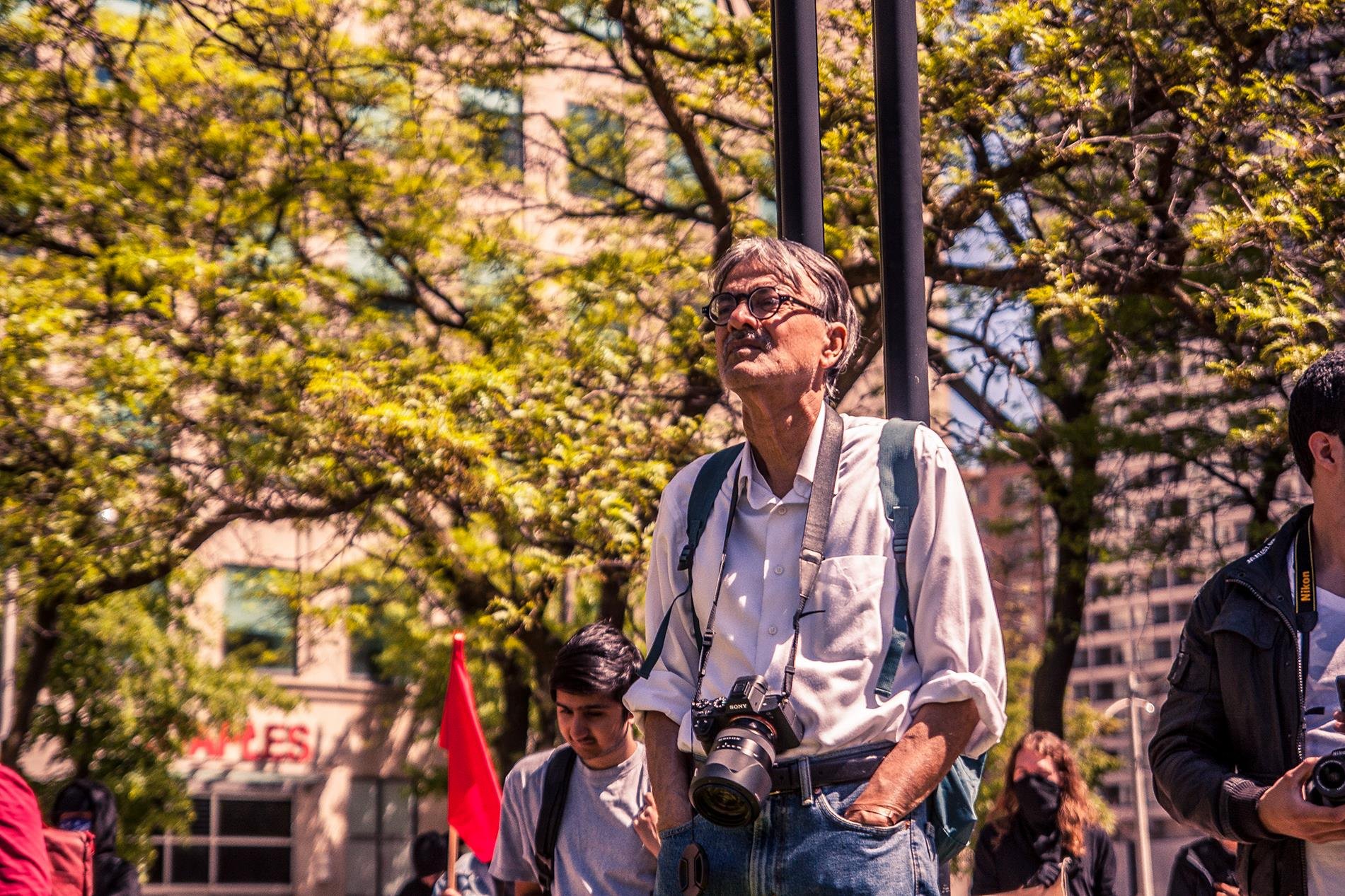
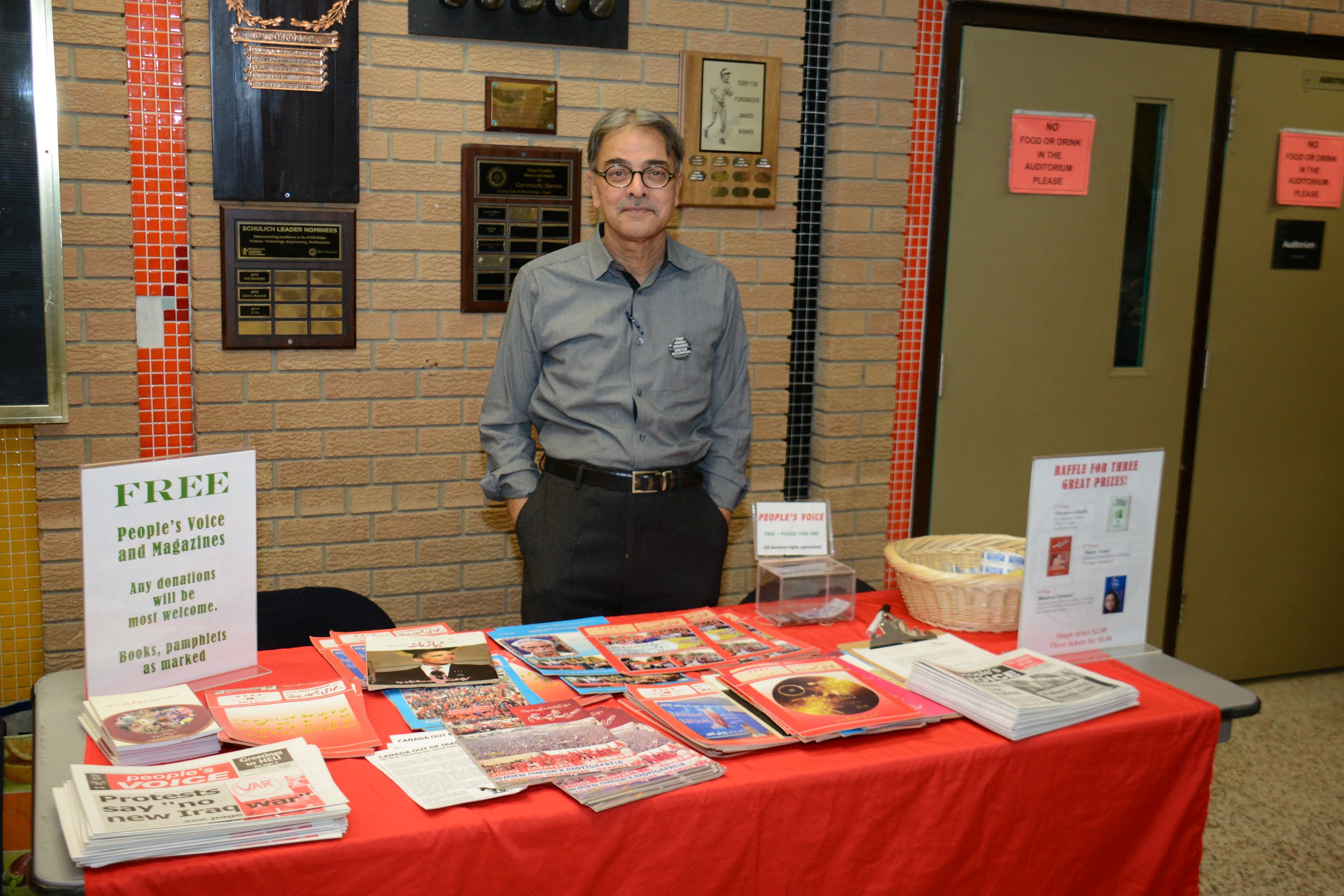
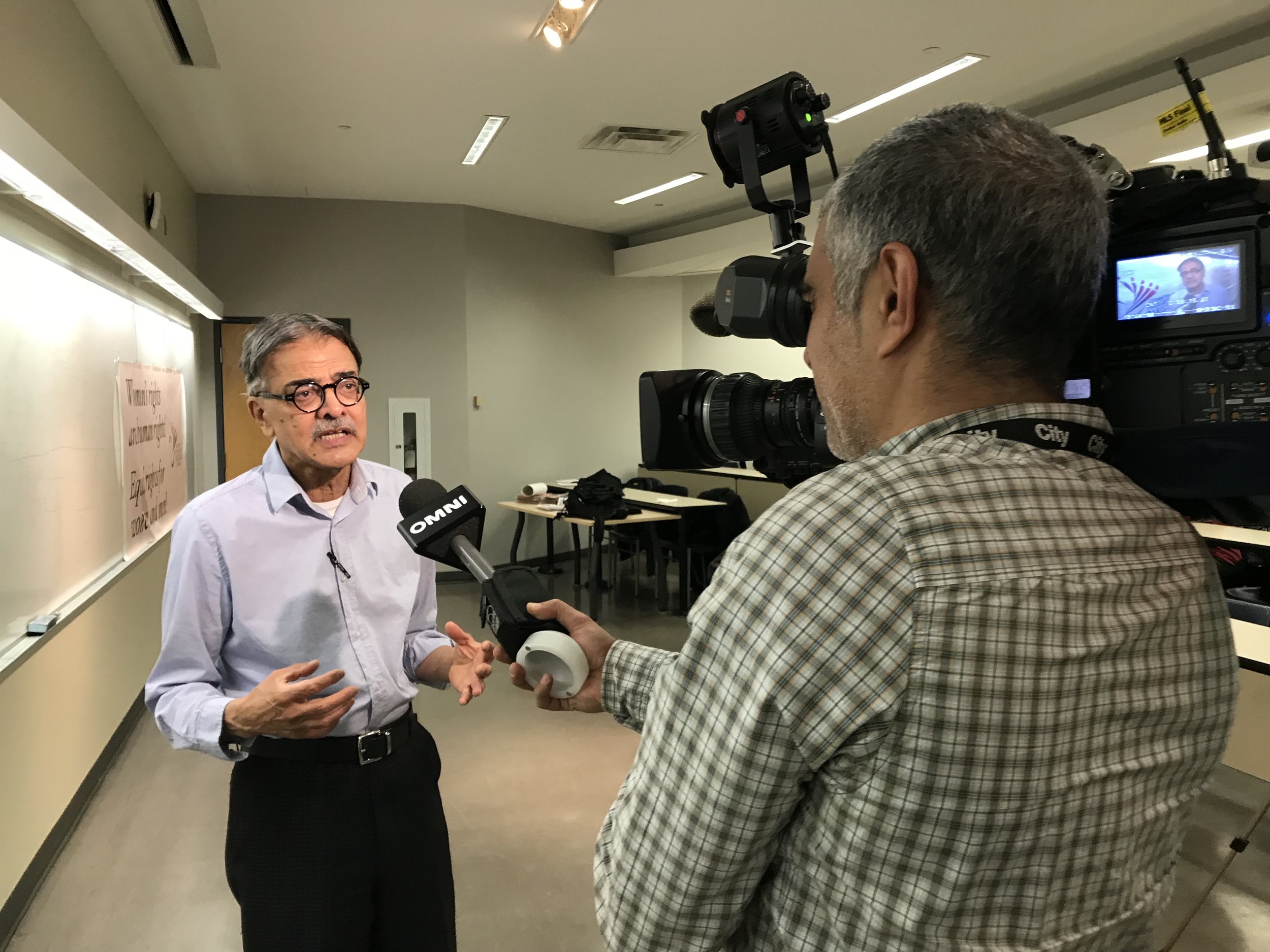
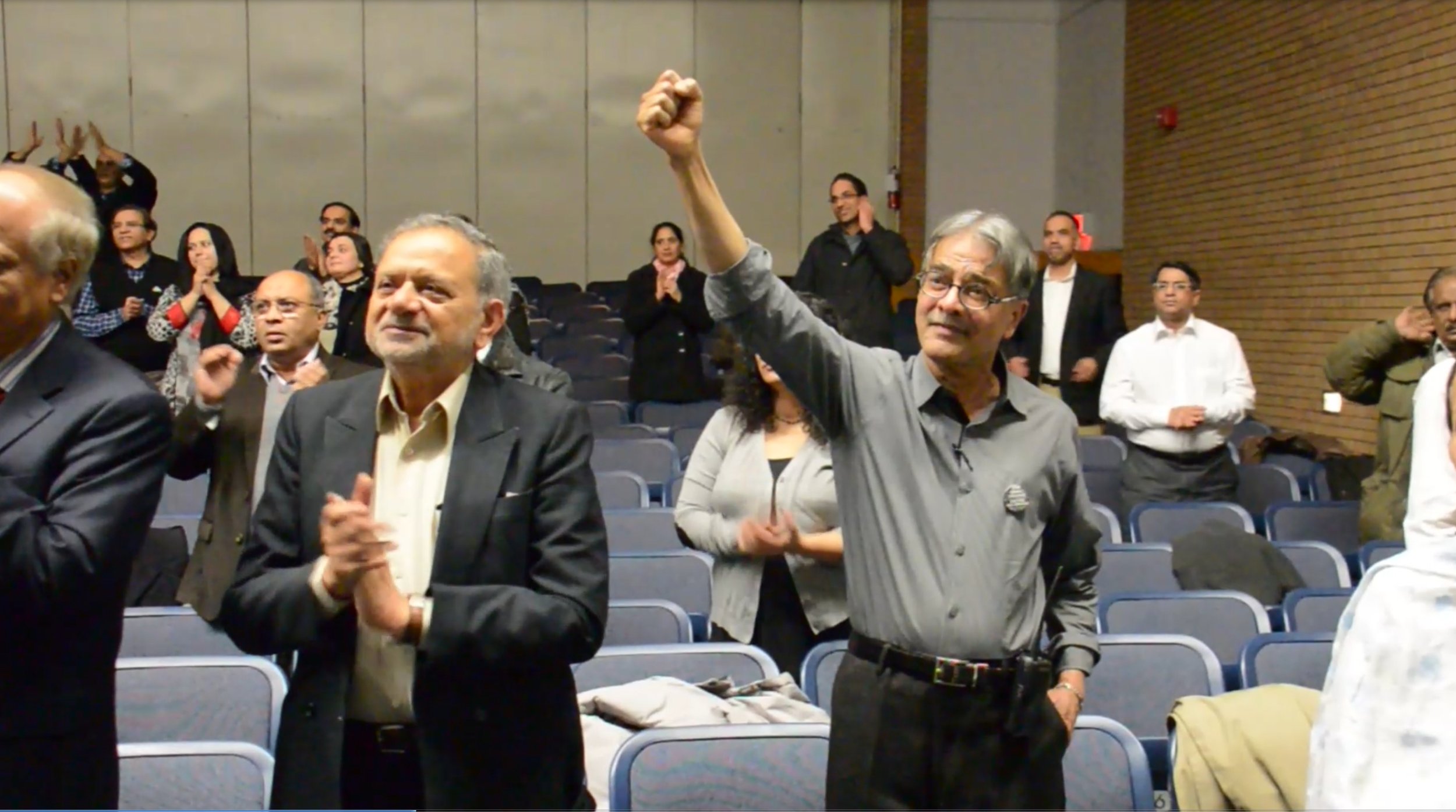
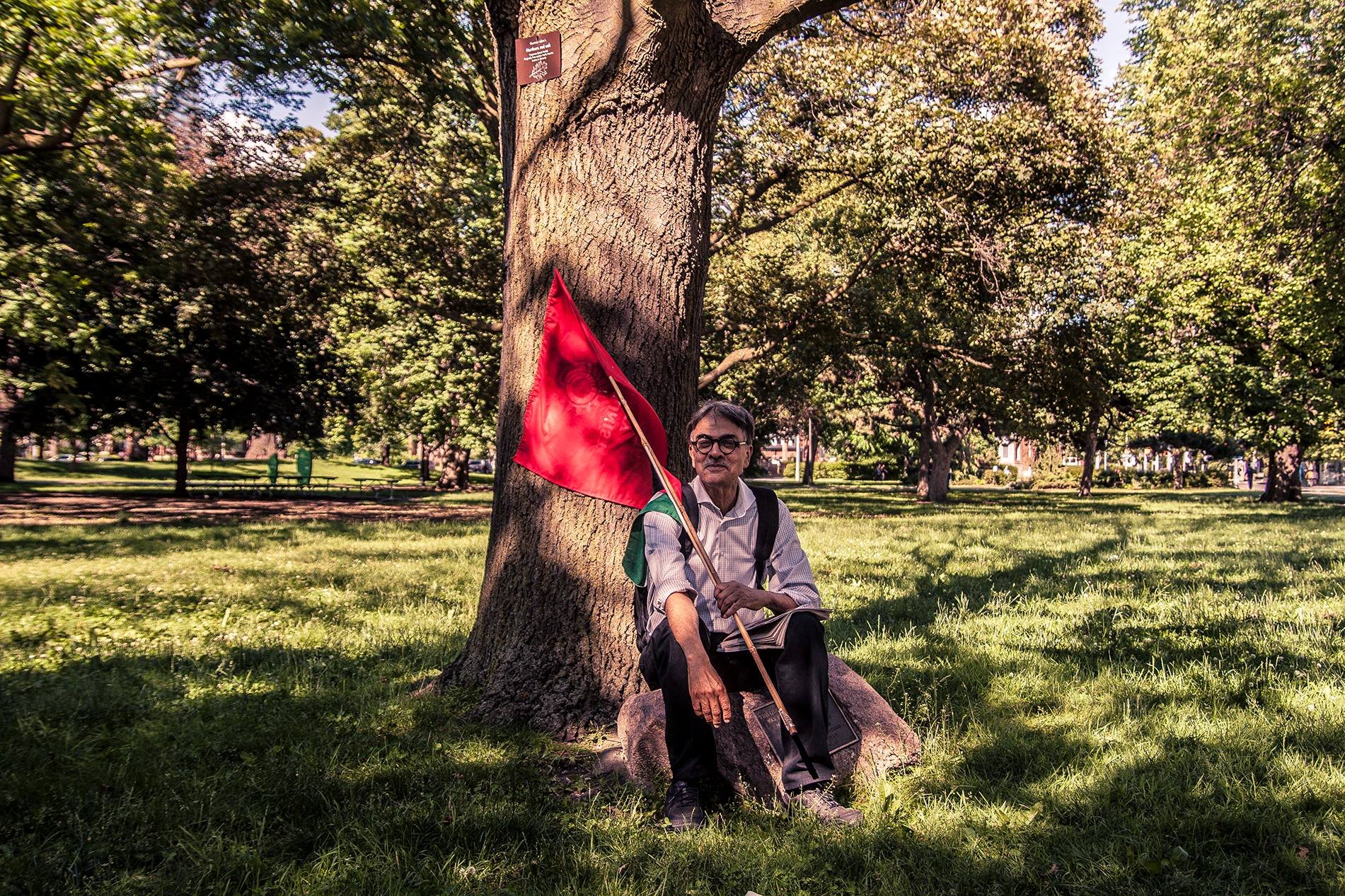
Honouring his memory and his commitment the CPPC has set up “Omar Latif Memorial Award for Justice and Peace” inaugurated at his death anniversary on August 10, 2022. The award is meant to support the individuals or organizations striving to bring progressive, secular and systemic change in the society. Readers are invited to nominate individuals or organizations as candidates for this award.
Tributes:
Abbas Syed recalls the last time he spoke to Omar: “He called me in the morning, and I asked him where he was. He said, “I’m at the hospital. Last night my defibrillator was dysfunctioning.” And, you know, before I could ask him how are you doing, he began chastising me for falling behind on my tasks for CPPC, my donation to the Party, and so on. That was Omar. That was the Omar I remember”
Fozia Tanveer: “His whole life was dedicated to the cause. Though he had a job, his core commitment was working for the Party and bringing people into the more formal structure of the Party… He was very clear that just having socialist ideology is not enough, people should work in a Party discipline for bringing about revolutionary change.”
Domenic and Samantha: “We miss our friend and Comrade. Loved by many and respected by all. Omar was truly inquisitive and willing to help anyone at any time.”
Readers are invited to contribute their tributes to Omar as comments on this article, which will be preserved by Jamhoor on this webpage
Jamhoor in collaboration with the Committee of Progressive Pakistani Canadians (CPPC)
Editor’s Note (Nov 2022): An earlier version of this article was revised to note the contribution of SALDA in Project Threadbare



